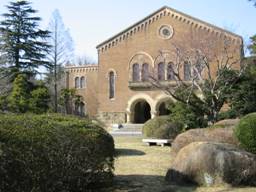| |
Οι Εμπειρίες της κ. Μαρκοπούλου |
|
| |
Acquire a profound knowledge of the Japanese language and enjoy high level studies |
I studied in Japan as a research student and grantee of the MEXT scholarship for three semesters (October 2001-March 2003) at Hitotsubashi University , in Tokyo (Kunitachi city). It is a rather small educational unit, specialized mostly in commerce, economics , law and social sciences, but very famous in Japan, since it is said that its graduates take significant positions and rank in the public sector. Combining high level studies with a well organized university life was the principal criterion for choosing among the hundreds of Universities in Japan, so I felt very lucky when the Japanese Government actually gave me the opportunity, through the MEXT scholarship, to study at this University. A letter of recommendation by the professor who guided me during my studies there was decisive, so I would advise any future candidate to communicate first with the University of his preference and try to obtain a better picture of the studies he can pursue in Japan. I had the chance to visit Japan a year prior to my departure and made an on-the-spot research of the possible Universities to study, but, since this is not the easiest way for somebody to get informed, I would suggest to check the list of the Japanese Universities that can be found at the Cultural and Educational Department of the Japanese Embassy in Greece and, of course, through internet. |

|
As good preparation can guarantee halfway to success, I would say that along with the research of what and where to study in Japan, one should take classes in Japanese, since the majority of the Universities offer their studies in Japanese. There are, of course, study programmes (MAs & PhDs) or separate classes offered in English at several Universities, so if someone doesn't feel confident of his language skills, he can always look up for those programmes. Knowing Japanese, of course, is important for everyday business, so even if one chooses educational programmes taught in English, speaking Japanese can really help him at his daily transactions. Besides, Japanese classes are, most of the time, offered at the University Campuses, so one can improve his language ability by taking these classes. I studied Japanese for three years in Athens (Proficiency level 3), so for the first six months I was enrolled at the Japanese language programmes, offered at the Centre for Student Exchange of the University, which was located within the University Campus. After a brief classification test, I joined two other foreign students (MEXT scholarship grantees, too) at a compulsory daily language programme, which started from 8.50 and -with a lunch break at 12- ended at 15.30 and contained reading, vocabulary, grammar, listening and writing skills etc. During the afternoon, there was a variety of optional Japanese language classes, such as Japanese terminology in the field of economics and law, oral practice, translation, use of PCs with Japanese characters etc., so I was dividing my time to extra Japanese classes and some University classes of my interest upon suggestion of my supervisor. All classes terminated around 19.00 or 20.00, so at the remaining time I could do some homework at the library (which was, by the way, remarkable) or return to the dormitories, where I was staying at a very low rental – note that all facilities are situated inside the University Campus. |
After completing the six-month preparatory course, I was enrolled at Law School , and attended a series of classes. The Japanese higher educational system, although based -as a rule- on the continental European model, has borrowed many elements from the American one. Thus, emphasis is given on the seminars, with compulsory attendance for the students. I attended my professor's seminar of International Law, participating with other students at presentations, oral and written, and debates on crucial international law matters –all in Japanese. Additionally, I attended other classes in public law (especially constitutional and parliamentary law) in order to have a better picture of the Japanese legal system. It was very interesting to discover that in spite of the fact that our legal systems belong to the same family (continental European), application and interpretation of law could be completely different in Japan, especially due to the unique historical conditions under which modern Japan was built. All classes were remarkably interesting, since commonly used in the West legal terms and institutions acquired a different meaning according to Japanese tradition and society. |
 |
At the same time, I kept attending the Japanese classes, as I discovered that the beauty of the Japanese culture is in many ways hidden within the kanji letters of the Japanese alphabet. Unfortunately little time was left for fun, since even during holidays (spring break and winter break), the Centre for Student Exchange offered intensive programmes of Japanese (on a daily basis, from morning until afternoon), which proved to be a real treasure. After one year in Japan , I succeeded at the examinations for Proficiency in Japanese level 2 (something that normally requires at least 2 years of preparation), and the following year I obtained the Diploma of Proficiency in Japanese, level 1.
Before returning to Greece, I made an excursion to catch up with everything I missed until then. Among others, I visited the Japanese Parliament and the beautiful Japanese country.
|
|
|
|
|
|
